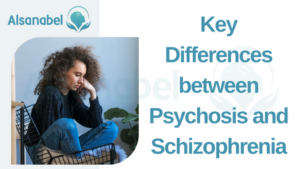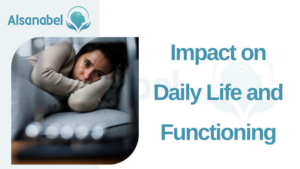Differentiating Psychosis from Schizophrenia 2023
- Category antipsychotic medications
Understanding Psychosis and Schizophrenia
Definition and symptoms of psychosis
Psychosis refers to a mental health condition characterized by a distorted perception of reality, often resulting in delusions, hallucinations, and impaired thinking and behavior. Symptoms of psychosis can vary from person to person but commonly include:
- Delusions: False beliefs that are not based on reality, such as thinking someone is reading their mind or that they possess special powers.
- Hallucinations: Sensory experiences that are not real, such as hearing voices or seeing things that aren’t there.
- Disorganized thinking and speech: Difficulty organizing thoughts or speaking coherently.
- Impaired functioning: Problems with daily activities, work, or social interactions.
Definition and symptoms of schizophrenia
Schizophrenia is a chronic mental disorder characterized by a combination of psychotic symptoms, such as hallucinations or delusions, and other cognitive, behavioral, or emotional disturbances. Symptoms of schizophrenia may include:
- Positive symptoms: This refers to symptoms that are not typically present in healthy individuals, such as hallucinations, delusions, disorganized thinking, and abnormal movements.
- Negative symptoms: These symptoms involve a loss of normal functioning, such as reduced motivation, social withdrawal, and anhedonia (inability to experience pleasure).
- Cognitive symptoms: Schizophrenia can also affect cognition, causing difficulties in attention, memory, and problem-solving abilities.
- Mood symptoms: Some individuals with schizophrenia may experience depressive or manic symptoms, further complicating their diagnosis.
It’s important to note that while psychosis is a defining feature of schizophrenia, not everyone who experiences psychosis has schizophrenia. Other conditions, such as bipolar disorder or severe depression, can also cause psychosis. Proper diagnosis by a medical professional is essential for accurate treatment and support.
Key Differences between Psychosis and Schizophrenia

Causes and risk factors of psychosis
Psychosis refers to a condition where an individual experiences a loss of contact with reality, resulting in delusions, hallucinations, and disorganized thoughts or behaviors. It can occur as a symptom of various underlying mental health conditions, including schizophrenia, bipolar disorder, and major depressive disorder. Substance abuse, sleep deprivation, and certain medical conditions can also trigger psychosis.
Causes and risk factors of schizophrenia
Schizophrenia, on the other hand, is a chronic and severe mental disorder characterized by a distortion in thinking, perceptions, emotions, and behavior. The exact cause of schizophrenia is not known, but it is believed to result from a combination of genetic, environmental, and neurochemical factors. Family history of schizophrenia, exposure to certain viruses, and prenatal complications are considered as risk factors for developing schizophrenia.
It is important to note that while psychosis is a symptom that can occur in various mental disorders, schizophrenia is a specific psychiatric disorder. Not everyone with psychosis has schizophrenia, but schizophrenia often involves psychosis as a symptom.
Differentiating psychosis from schizophrenia requires a comprehensive evaluation by a mental health professional. This may include interviews, medical history assessment, and psychological testing. The diagnosis is made based on the presence of specific symptoms and the duration of those symptoms.
Read more:
Top 10 Warning Signs Of Mental Illness
Diagnosis and Assessment
When it comes to mental health conditions, it is important to have a clear understanding of the specific symptoms and diagnostic criteria. Differentiating between psychosis and schizophrenia can be challenging, as there are overlapping symptoms. However, with the help of diagnostic criteria and tools, healthcare professionals can accurately identify and differentiate these conditions.
Diagnostic criteria and tools for psychosis
Psychosis is a mental health condition characterized by a loss of contact with reality. Key symptoms include hallucinations, delusions, and disorganized thinking. To diagnose psychosis, healthcare professionals rely on diagnostic criteria, such as the Diagnostic and Statistical Manual of Mental Disorders (DSM-5), which provides a standardized framework for assessing and diagnosing mental disorders. Additionally, tools such as the Positive and Negative Syndrome Scale (PANSS) are used to assess the severity of symptoms and track changes over time.
Diagnostic criteria and tools for schizophrenia
Schizophrenia is a chronic mental disorder that often manifests in early adulthood. It involves a combination of positive symptoms (hallucinations, delusions) and negative symptoms (social withdrawal, lack of motivation). To diagnose schizophrenia, healthcare professionals utilize the DSM-5 criteria, which outline specific symptoms and duration requirements. Tools like the Brief Psychiatric Rating Scale (BPRS) are used to evaluate the severity of symptoms and monitor treatment progress.
Accurate diagnosis and assessment are crucial for effective treatment planning. By understanding the distinct diagnostic criteria and utilizing appropriate tools, healthcare professionals can provide targeted interventions and support for individuals with psychosis or schizophrenia. It is important to consult a qualified healthcare professional for a comprehensive evaluation and diagnosis.
Treatment Approaches for Psychosis and Schizophrenia
Medication options for psychosis
When it comes to treating psychosis, there are several medication options available. Antipsychotic medications are often the first line of treatment. These medications work by blocking the effects of dopamine, a neurotransmitter that is believed to play a role in psychosis. Some common antipsychotic medications include risperidone, olanzapine, and quetiapine. These medications can help reduce hallucinations, delusions, and other symptoms associated with psychosis. It is important to note that medication alone may not be sufficient, and therapy and other interventions may be necessary for comprehensive treatment.
Medication options for schizophrenia
Schizophrenia is a chronic mental disorder that requires long-term treatment. Medications are a crucial component of managing this condition. Antipsychotic medications, both first-generation and second-generation, are commonly used for treating schizophrenia. Examples of first-generation antipsychotics include haloperidol and chlorpromazine, while second-generation antipsychotics include aripiprazole and clozapine. These medications help reduce symptoms such as hallucinations, disorganized thinking, and social withdrawal. It should be noted that the choice of medication depends on the individual’s specific symptoms and needs.
It is important to consult with a healthcare professional to determine the most appropriate treatment approach for psychosis or schizophrenia. A combination of medication, therapy, and support services can help individuals manage their symptoms and lead fulfilling lives. Regular monitoring and adjustments to the treatment plan may be necessary to ensure optimal outcomes.
Psychosocial Interventions for Psychosis and Schizophrenia
When it comes to mental health concerns like psychosis and schizophrenia, understanding the differences is crucial for effective treatment. While both conditions may involve similar symptoms, it is essential to differentiate between them to tailor therapy and counseling accordingly.
Therapy and counseling for individuals with psychosis
When treating individuals with psychosis, therapy and counseling play a vital role in helping them manage their symptoms and improve their overall well-being. Some common types of therapy include:
- Cognitive Behavioral Therapy (CBT): CBT focuses on identifying and challenging negative thoughts and behaviors, helping individuals develop coping strategies and improve their sense of control.
- Family Therapy: By involving family members or close friends, family therapy aims to improve communication, reduce stress, and provide a supportive environment for the individual with psychosis.
Therapy and counseling for individuals with schizophrenia
For individuals diagnosed with schizophrenia, therapy and counseling serve as crucial components of their treatment plan. Some effective approaches include:
- Psychosocial Rehabilitation: This type of therapy focuses on improving social and vocational skills, enhancing independence, and promoting community integration.
- Supportive Therapy: Supportive therapy aims to provide encouragement, emotional support, and practical guidance to individuals with schizophrenia, helping them navigate daily challenges.
It is important to note that therapy and counseling approaches may vary depending on an individual’s unique needs and preferences. Working closely with a mental health professional can ensure personalized treatment and support for individuals with psychosis and schizophrenia.
Impact on Daily Life and Functioning

Effects of psychosis on daily life and functioning
When someone experiences psychosis, they may have difficulty distinguishing between what is real and what is not. This can significantly impact their daily life and functioning in various ways, such as:
- Impaired thinking and reasoning: Psychosis can affect a person’s ability to think logically and make sound judgments, making tasks that require problem-solving and decision-making challenging.
- Difficulty with concentration: People with psychosis may struggle to focus and maintain attention, making it difficult to complete tasks or follow instructions.
- Disrupted sleep patterns: Psychosis can disrupt sleep, leading to difficulties in maintaining a consistent sleep schedule and feeling rested.
Effects of schizophrenia on daily life and functioning
Schizophrenia, a chronic mental disorder characterized by psychotic symptoms, can have a significant impact on a person’s daily life and functioning. Some effects may include:
- Social withdrawal: People with schizophrenia may withdraw from social activities, relationships, and hobbies due to difficulties in social interactions and a sense of isolation.
- Difficulty maintaining employment: Schizophrenia can make it challenging to sustain employment due to difficulties with concentration, organization, and social interactions.
- Impaired self-care: Daily tasks such as personal hygiene, managing medication, and maintaining a healthy lifestyle can become challenging for individuals with schizophrenia.
It is essential to seek professional help for early diagnosis and treatment of both psychosis and schizophrenia to minimize their impact on daily life and promote better functioning. With appropriate support and treatment, individuals can manage their symptoms and improve their overall quality of life.
In conclusion, differentiating psychosis from schizophrenia can be a complex task for healthcare professionals. Psychosis is a symptom that can occur in various mental illnesses, whereas schizophrenia is a specific disorder characterized by a combination of symptoms, including psychosis.
In order to accurately differentiate between psychosis and schizophrenia. Early detection and intervention are essential for improving outcomes and providing appropriate care for individuals experiencing these conditions.
Read more:









